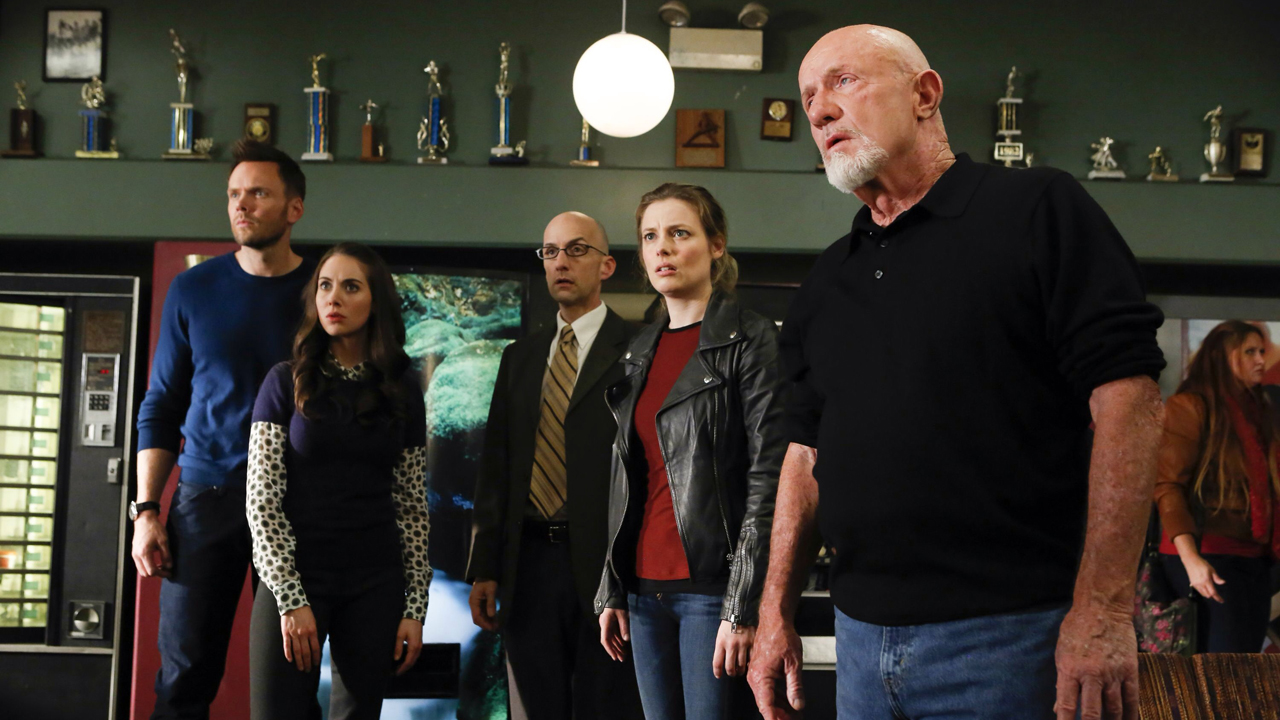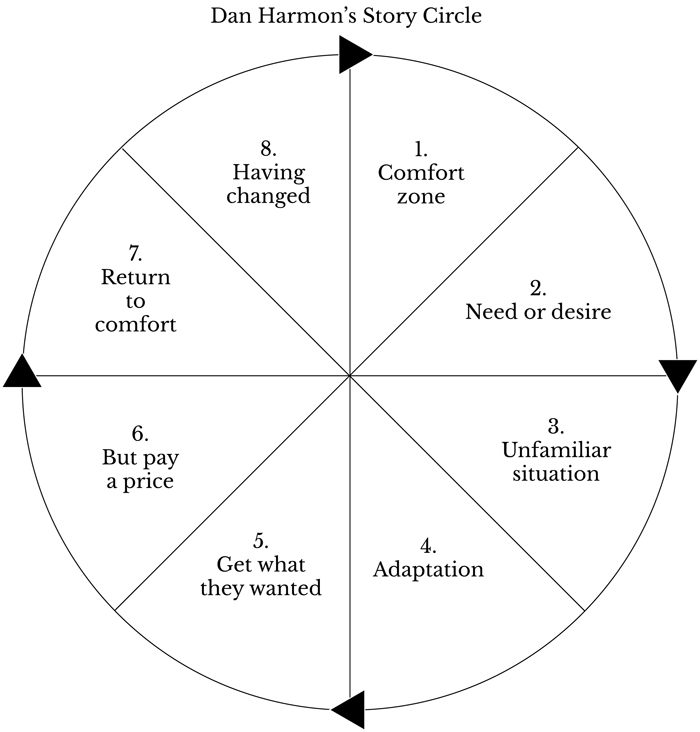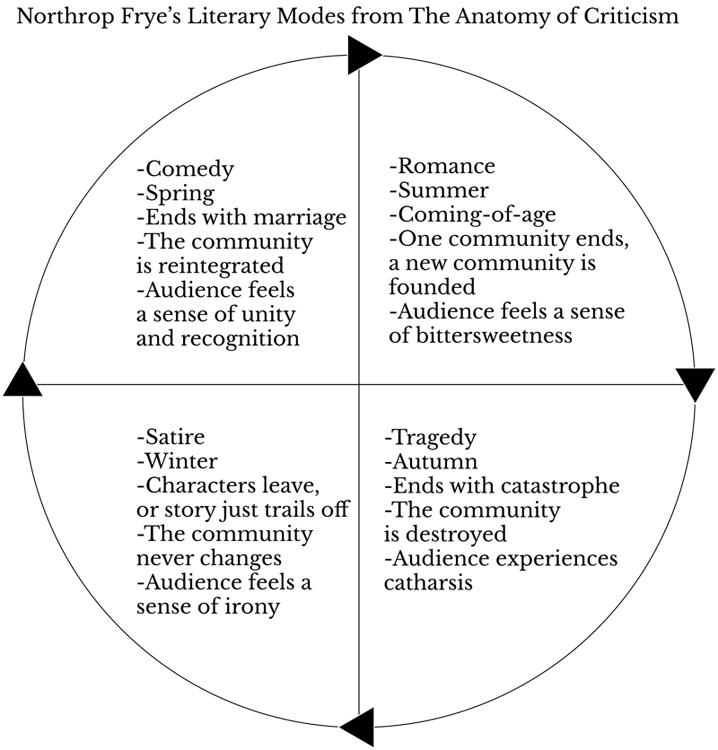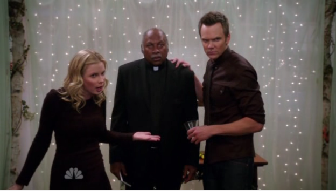Last week on NBC’s Community, Abed tried to impose a story structure on the goings-on of Greendale, but what kind of story is this, really? We’ll have to answer this question if we’re to guess the end of this season’s finale, which may be the conclusion of the series as a whole.
“How’s it gonna end?” I ask, quoting acclaimed Denzel vehicle John Q. The name of this week’s episode, “Basic Story,” provides a clue. The title recalls show-runner Dan Harmon’s piece, “Story Structure 101: Super Basic Shit,” where he introduced his famous “story circle”:
According to the circle, Community is a heroic quest: characters enter an unfamiliar situation to get what they want, and they eventually get it, having lost something and having changed. Twentieth century literary critic Northrop Frye would call this a story in the “romantic mode,” which features larger-than-life characters, heroic trials, and bittersweet conclusions.
Abed wants to be in this story. He talks about calls to adventure, crossing the threshold – all that Joseph Campbell stuff you learned in high school (or at your local Star Wars convention). If Community is a romance, it will end when one society fades away and a new one takes its place. Greendale will diminish into an empty, magic-less Rivendell, but the study group will triumphantly enter the Fourth Age of Man and create a new, more grown-up society outside their community college borders.
Jeff and Britta are trying to force Community into a different story mode: the mode of comedy. Here’s how comedies work, according to Frye: two people want to get together, something temporarily prevents them from doing so, and finally they get married. In traditional comedies and modern Bollywood movies, meddling outsiders (like parents or Annie Edison) prevent the couple’s legal union. But in most modern rom-coms, the threat is internal. The protagonists have character defects that must be fixed before they can finally mate. In either case, their marriage brings the community back together. All its conflicts resolved, the society can continue, happily ever after.
It’s normal for a sitcom to end with a wedding, but I think Community‘s too subversive and meta to be so straightforward. Anyway, we’re not sure if the show’s ending at all, and a season 6 with a married Jeff and Britta would just be weird.
Another option is that Community‘s in Frye’s third story mode: satire. This is the mode in which no one no one learns a lesson and no one ever, ever changes. Overthinking It’s own Pete Fenzel has made this point before: most of the humor in a sitcom stems from the characters’ unchanging natures. We laugh at Britta because she’s always going to Britta something. We laugh at the dean because he’s always got a new costume.
Satires usually end in one of two ways. Either the characters remain stuck in their unchanging society, doing the same things forever and ever, or they say “to hell with this” and, unchanged, get out of Dodge. If Community‘s a satire, it could end semi-darkly, with the characters remaining in Greendale forever, trapped in the loop of syndication on TBS.
Or maybe Community will figure out a way to combine all these different endings. I foresee a final Jeff speech where he learns the lesson that life doesn’t need a lesson. Community‘s community may leave the boundaries of Greendale, but it will ultimately remain unchanged. At the same time the characters will be changed, because they’ll have freed themselves from their compulsion to change themselves. The sitcom they live in will then end just as they accept themselves as sitcom characters, and they’ll find their happily ever after by accepting that life has no happily ever afters. Abed would like this ending, I think. I’m getting confused just writing it.
I guess we’ll have to find out this Thursday. Until then, all we can know for sure is that Rust Cohle was half-right. Community, at least, is some kind of a flat circle.





What if Community does something that falls into one of these pie pieces, but in a way that comments on that thing as a trope or what have you? Is there a meta-pie for such occurrences?
Good question. In his book Anatomy of Criticism, Frye implied that all postmodern texts automatically fall under the satire heading, but I don’t know if that applies to Community. This show tries to have things both ways; it’s our old “earony” (earnest irony) concept in action. Harmon & co. like to satirize romance stories but kind of play them straight at the same time. If we look back on the previous seasons of the show and at Harmon’s story circle, it appears that Community as a whole is more romance than anything.
Frye would shy away from calling Community a satire, because satires typically star grotesques whom audiences can look down upon. Community’s characters, on the other hand, are somewhat mimetic, somewhat larger-than-life figures, suggesting the show more naturally belongs in the romance or comedy slices of the pie, regardless of its metaness.
So, based on this, I think we can assume that the Community finale will be a tragedy. Literary Modes Circle complete!
Interesting that this dove-tails with a random thought that popped into my head at work today. Has any comedy truly ended in a tragedy? The closest modern example I could think of would be How I Met Your Mother, which ended with a death, but even that tried to be bittersweet and make it a story about moving on.
I remember back in season 2 when Abed watched the “British inspiration” for Cougartown – Cougarton Abbey, which ended with the whole cast dying. If any series was to pull of something super dark, I could see Community doing it, but is there any precedent for successful comedies ending in death/destruction?
Blackadder, arguably.
I don’t think there is anything arguable about Blackadder’s ending falling under the umbrella of tragedy. I’m trying to think of dark comedies, but a lot of them are satires that end with satirical endings, even if they are satirically tragic.
Some comedies end on down notes, such as Mary Tyler Moore, but I don’t think that falls under tragedy. Now I feel like pondering this myself.
Also, one of the shows I’ve concocted over the years I always imagined ending with a whole bunch of people having a BBQ and having fun, and then somebody running in and yelling, “Hey everybody! Let’s go kill ourselves” and everybody cheers and start running until everybody runs off a cliff and dies. However, this was a highly absurdist comedy, so I doubt even it would qualify as tragic. It’s like how Sealab blew up a billion times, but was never tragic.
“Dinosaurs” did, notoriously. Not sure if that qualifies as a “successful” comedy, though.
While, in the abstract, the ending of Dinosaurs may seem like tragedy, but I think it falls under the category of satire. The people behind that show would have classified it, on the whole, as such, and many of the show’s plots were of the social commentary variety.
For example, in the final episode, it is the hubris of the dinosaurs, and there lack of concern for the environment, that dooms them to their eminent death. While a mass extinction has tragic overtone, the way it played out on Dinosaurs is still probably more of a satire.
Also, that show is awful and the puppets are nightmarish to look at.